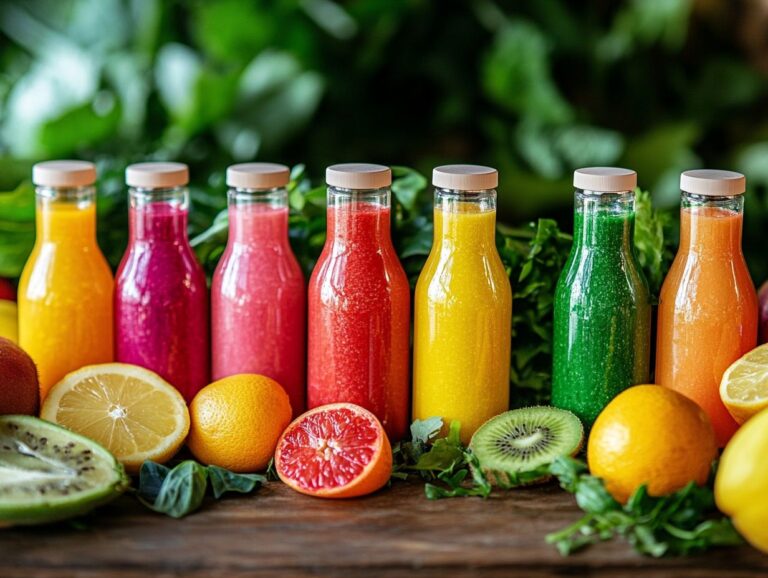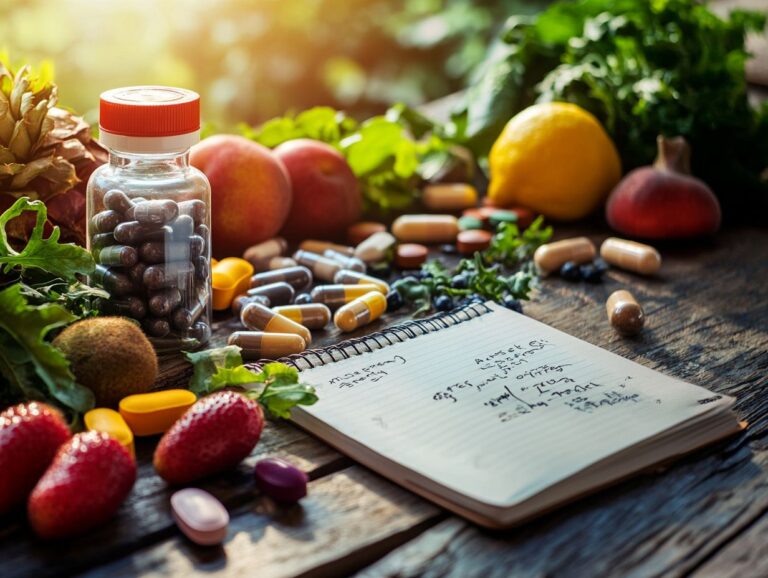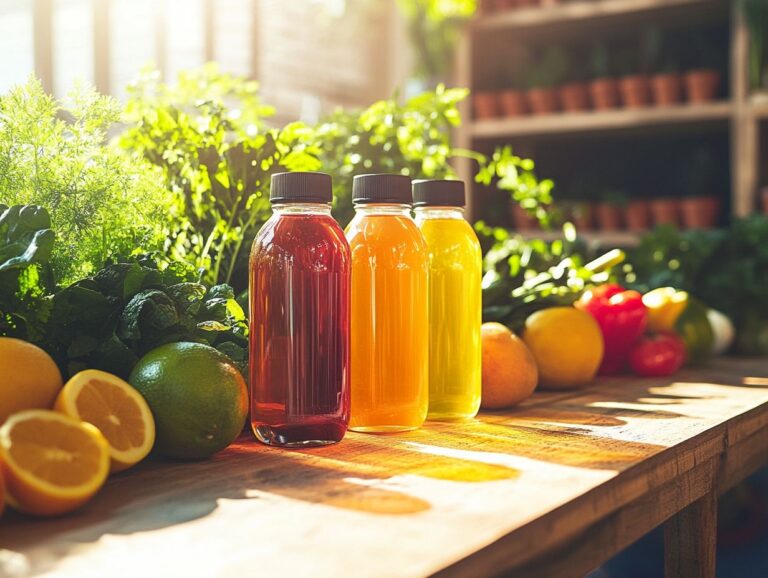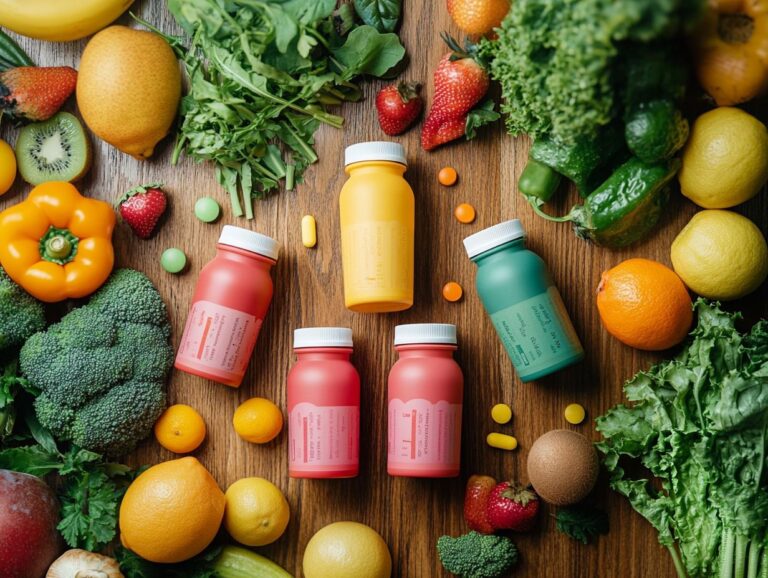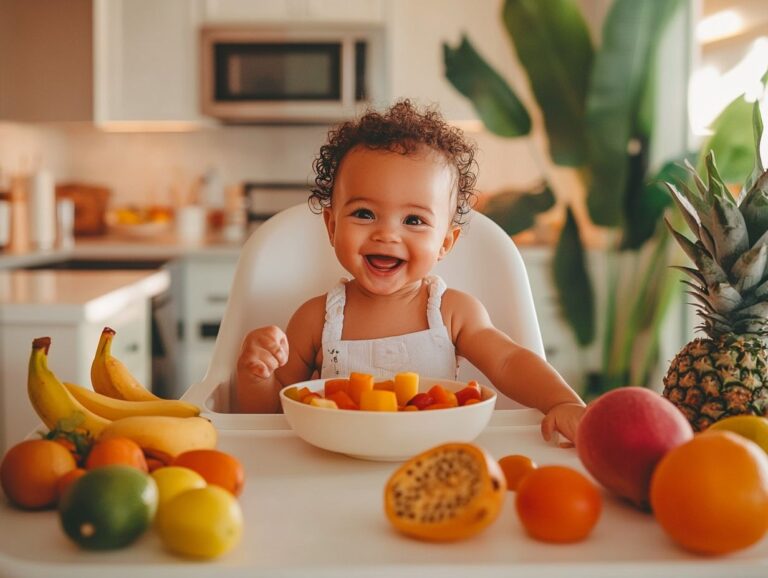Pregnancy is an exciting time in life, and for those who choose a **vegan lifestyle**, it comes with unique considerations and advantages. This article explores what a **vegan pregnancy** entails, highlighting its numerous **benefits** and important **nutritional requirements**. It also features several **vegan pregnancy books** that provide valuable guidance, recipes, and support. Whether you are an experienced vegan or new to the **plant-based lifestyle**, these resources will assist you in having a **healthy and enjoyable pregnancy**.
What Is a Vegan Pregnancy?

A vegan pregnancy occurs when an expectant mother follows a plant-based diet that excludes all animal products, including meat, dairy, and eggs. This comprehensive guide emphasizes the importance of understanding fertility nutrition and the role of nutrition studies in ensuring a healthy pregnancy.
It is essential for mothers to be aware of the nutritional challenges associated with this diet, as studies suggest that a well-planned vegan diet can provide the necessary nutrients for a healthy pregnancy and fetal development.
This article will explore the special considerations and challenges of a vegan pregnancy and emphasize the importance of consulting with a registered dietitian and participating in childbirth classes to ensure that both the mother and baby receive adequate nutrition throughout the pregnancy. Additionally, nutrition recommendations from experts like Reed Mangels, PhD, RD, can provide further guidance.
What Are the Benefits of a Vegan Pregnancy?
A vegan pregnancy offers several advantages, including a lower risk of developing gestational diabetes, reduced blood pressure, and an increased intake of essential vitamins and minerals that contribute to a healthy pregnancy. For those new to this lifestyle, books like ‘Your Complete Vegan Pregnancy’ by Reed Mangels can be particularly helpful.
A nutritious vegan diet should include whole foods such as fruits, vegetables, whole grains, and legumes, which provide vital nutrients for both the mother and the child.
Nutrition recommendations for a vegan pregnancy offer guidance on dietary choices, while practical tips address common concerns associated with following a plant-based diet during this time.
Embracing a vegan pregnancy can also enhance overall wellness by boosting the intake of antioxidants, which help reduce oxidative stress. To meet nutritional needs, mothers can include fortified foods or supplements containing vitamin B12, iron, and omega-3 fatty acids. Practical tips and advice can also be found in books like ‘The Plant-Based Dietitian’s Guide to Fertility’ by Lisa Simon, RD.
For optimal health, babies should be introduced to a variety of brightly colored fruits and vegetables daily until they reach 18 months. This approach ensures that they receive all the essential nutrients needed for their growth and development.
Pregnant mothers can improve time management and maintain healthy eating habits by meal prepping for the week ahead. Additionally, understanding the protein content of plant-based foods such as quinoa, lentils, and tempeh is crucial, as protein intake requirements increase during pregnancy. Resources like ‘Nourish’ by Reshma Shah, MD, MPH, and Brenda Davis, RD, provide valuable insights on family meals and balanced ways to meet nutritional needs.
What Are the Nutritional Requirements for a Vegan Pregnancy?
The nutritional requirements for a vegan pregnancy are similar to those of any pregnant woman; however, special attention must be given to certain key nutrients, including protein, vitamin B12, iron, calcium, omega-3 fatty acids, and folate. These nutrients are essential for fetal growth and development, as well as for the health of the mother. Books like ‘Plant-Based Nutrition in Clinical Practice’ by Shireen Kassam, MD, and Zahra Kassam, MD, can offer detailed nutrition science guidance.
To ensure that these nutritional needs are adequately met during a vegan pregnancy, it is crucial to work with a registered dietitian who can create a prenatal nutrition plan tailored to address vegan-specific considerations while incorporating a variety of plant-based sources for these key nutrients.
Research indicates that with careful planning, vegan diets can meet or even exceed the nutritional requirements during pregnancy, supporting both maternal health and fetal growth. It is also important to consider breastfeeding considerations and postpartum nutrition to ensure ongoing health and wellness.
- Adequate Protein Intake: During pregnancy, protein needs increase by 30% to 50%. Good sources of protein for a vegan diet include lentils, beans, quinoa, and tofu. Resources like ‘The Mama Natural Week-by-Week Guide to Pregnancy and Childbirth’ by Ina May Gaskin can provide additional meal planning ideas.
- Vitamin B12: The requirements for vitamin B12 more than double during pregnancy, as it is essential for the development of red blood cells and the fetal nervous system. While vitamin B12 is typically found in animal products, vegans can obtain it from fortified foods or supplements.
- Iron: Iron requirements can increase by as much as 80% during pregnancy due to a 50% rise in blood volume. Vegan sources of iron include chickpeas, lentils, beans, spinach, and fortified cereals. Iron absorption is significantly enhanced when consumed with vitamin C-rich foods.
- Calcium: Calcium requirements double during pregnancy, reaching 1,000 mg per day (or 1,300 mg for women under 19) and are necessary for fetal bone development. Vegan sources of calcium include fortified plant milks, kale, collard greens, broccoli, bok choy, okra, and almonds.
- Omega-3 Fatty Acids: The requirement for omega-3 fatty acids also increases during pregnancy, as these nutrients are important for neurological development. Vegan sources of omega-3 fatty acids include flaxseeds, chia seeds, and walnuts.
- Folate: Folate is crucial for proper DNA synthesis, red blood cell formation, and the prevention of neural tube defects. Folate requirements increase by 50% to 600 micrograms per day and can be found in leafy green vegetables, citrus fruits, beans, and fortified cereals.
Personalized guidance from a registered dietitian can provide essential support in navigating these nutritional requirements effectively. Books like ‘Vegan for Her’ by Virginia Messina MPH, RD, and JL Fields can offer additional support for vegan-specific issues.
What Are the Best Vegan Pregnancy Books?
The best vegan pregnancy books address the unique challenges of maintaining a vegan diet during pregnancy and offer recipes to meet the dietary requirements of expectant mothers. Titles like ‘Becoming Vegan’ and ‘Eating Plant-Based’ provide comprehensive guidance on nutrition science and practical tips.
“Your Complete Vegan Pregnancy” by Reed Mangels and “The Vegan Pregnancy Survival Guide” by Sayward Rebhal are two highly recommended titles in this category.
These books provide insights into nutritional science, along with practical tips on meal planning and preparation, featuring a variety of delicious recipes. Additionally, they take into account the dietary needs of breastfeeding and postpartum periods.
1. ‘The Kind Mama’ by Alicia Silverstone
“The Kind Mama” by Alicia Silverstone is a comprehensive guide that promotes a compassionate approach to vegan pregnancy. The book covers essential topics such as nutrition, plant-based recipes, practical tips, and mindfulness throughout the pregnancy journey.
Silverstone shares her personal experiences alongside practical advice for addressing common challenges, encouraging mothers to adopt a balanced diet that is beneficial for both themselves and their babies. This informative book delves into the key nutrients required by vegan mothers-to-be, discussing important subjects like sources of protein, the necessity of omega-3 fatty acids, and calcium requirements.
It also provides a variety of plant-based recipes that simplify meal planning and ensure women can optimally nourish their bodies. Additionally, Silverstone addresses breastfeeding concerns, offering guidance on how to maintain nutritional balance while nursing. Her practical approach fosters honest conversations about both the emotional and physical changes experienced during pregnancy.
2. ‘The Vegan Pregnancy Cookbook’ by Lorena Novak Bull

“The Vegan Pregnancy Cookbook,” authored by Lorena Novak Bull, is a thoughtful collection of healthy plant-based recipes designed to meet the nutritional needs of expectant mothers. Blending nutritional science with practical cooking techniques, this book enables mothers to prepare well-balanced meals that support a healthy pregnancy.
Emphasizing the significance of key nutrients such as protein, iron, calcium, and omega-3 fatty acids, the cookbook offers a variety of delicious and easy-to-make dishes that are essential for both maternal and fetal health.
Each recipe is carefully crafted to combine appealing flavors and textures, catering to diverse taste preferences while ensuring high nutritional value. The book not only instructs mothers-to-be on what to eat but also educates them about the health benefits associated with plant-based ingredients.
By integrating scientific knowledge and cooking skills, “The Vegan Pregnancy Cookbook” serves as an invaluable resource for expecting mothers, guiding them on their journey to nutritious eating during pregnancy. For those navigating the postpartum period, books like ‘The Fourth Trimester’ by Kimberly Ann Johnson and ‘The First Forty Days’ by Parto Ativo offer additional insights.
3. ‘Vegan Pregnancy Survival Guide’ by Sayward Rebhal
The Vegan Pregnancy Survival Guide by Sayward Rebhal equips expectant mothers with essential information to maintain a healthy pregnancy while adhering to a vegan lifestyle. This book offers vital nutrition recommendations, addresses common concerns, and provides practical tips for creating balanced meals that promote maternal and fetal health throughout pregnancy.
The guide emphasizes the importance of whole foods, encouraging women to incorporate a diverse range of plant-based ingredients to ensure they obtain sufficient vitamins and minerals necessary for fetal development. For further reading, consider ‘The Plant-Based Dietitian’s Guide to Fertility’ by Lisa Simon, RD.
Key nutrients such as protein, iron, calcium, and omega-3 fatty acids are discussed regarding their significance and dietary sources for those on a vegan diet.
Additionally, the author tackles the psychological challenges that arise from navigating societal expectations, offering reassurance and a sense of community support to mothers-to-be, ultimately fostering a healthy mindset during this transformative period. The book ‘Parto Ativo’ also provides valuable insights into maintaining a healthy diet and mindset during this time.
4. ‘Skinny Bitch Bun in the Oven’ by Rory Freedman and Kim Barnouin
“Skinny Bitch Bun in the Oven” is a candid yet informative book about vegan pregnancy, written by Rory Freedman and Kim Barnouin. With its humorous approach to nutritional science, the book emphasizes the importance of a healthy diet and provides guidance on how to stay energized and healthy during this significant phase of life. It also answers common nutrition questions and offers practical tips for managing a vegan pregnancy.
The book’s double-edged tone helps readers navigate the often confusing and overwhelming information surrounding food and pregnancy, offering clear answers with minimal stress. Light-hearted anecdotes illustrate essential nutritional concepts in an entertaining manner, teaching pregnant women about the numerous benefits of a plant-based diet while highlighting the importance of obtaining adequate nutrients and enjoying the journey.
For instance, practical tips for meal planning and snack suggestions keep the topic of maintaining a healthy lifestyle engaging, even during such a crucial time.
5. ‘The Everything Vegan Pregnancy Book’ by Reed Mangels
“The Everything Vegan Pregnancy Book” by Reed Mangels is a comprehensive guide for expectant mothers on how to maintain a healthy vegan pregnancy, supported by the expertise of a registered dietitian. This book addresses nutritional requirements, offers recipes, and provides practical tips for breastfeeding, making it one of the best resources for ensuring a healthy pregnancy while following a vegan lifestyle.
The author, with an impressive background in nutritional science and extensive experience as a registered dietitian, delivers research-backed advice that is clear and easy for expectant mothers to implement. The book includes specific guidance on essential vitamins and minerals needed during pregnancy, such as folic acid and iron, which are crucial for fetal development.
Additionally, it addresses many common questions that arise during this period, offering practical solutions and promoting a balanced approach to veganism.
6. ‘The Vegan Pregnancy Field Guide’ by Skye Chilton
The Vegan Pregnancy Field Guide by Skye Chilton offers practical nutrition recommendations and tips for expecting mothers who are embracing a vegan lifestyle.
This guide focuses on ensuring a healthy diet throughout pregnancy, providing strategies to address common nutritional concerns and enhance maternal well-being.
It covers important topics, such as identifying adequate protein sources and ensuring sufficient intake of essential vitamins like B12, iron, and calcium, diving into the nuances of vegan nutrition tailored specifically for pregnancy.
Additionally, the guide emphasizes the importance of whole foods, nutrient-dense meals, and a diverse array of fruits and vegetables to support the growth of both mother and baby.
By addressing common challenges, such as overcoming food aversions and managing cravings, this book serves as a comprehensive companion for those on the journey to motherhood while maintaining ethical dietary choices.
7. ‘Vegan Pregnancy 101’ by Sayward Rebhal

Vegan Pregnancy 101″ by Sayward Rebhal is an excellent resource for pregnant women following a vegan diet, as it focuses on nutritional science and offers practical advice for a successful pregnancy.
The book highlights the importance of considering breastfeeding and provides suggestions for creating a nutritious, balanced diet that supports both the mother and child. Its chapters outline the crucial nutritional components necessary to maintain the health of both mother and baby during this period.
Mothers can learn how to incorporate essential vitamins and minerals into their diets to meet their own needs while ensuring proper development for their babies. The book also addresses the significance of prenatal nutrition and common challenges faced by those on a plant-based diet.
Additionally, it offers mindful eating strategies that promote not only physical health but also mental well-being, helping mothers successfully navigate their pregnancy while nourishing their families.
What Information Can Be Found in These Books?
Vegan pregnancy books provide a wealth of information covering various topics essential for ensuring a healthy pregnancy while adhering to a plant-based diet.
Expecting mothers can explore nutritional studies that support the health benefits of a vegan approach, along with practical tips for meal planning and preparation of plant-based recipes tailored to their unique dietary needs.
Furthermore, many of these books discuss breastfeeding considerations, offering valuable insights on maintaining a healthy lifestyle after pregnancy.
1. Nutrition for a Healthy Vegan Pregnancy
Nutrition during a healthy vegan pregnancy emphasizes the importance of expecting mothers paying close attention to obtaining essential nutrients such as protein, iron, and vitamin B12 to support good maternal health and fetal development.
Research indicates that if expecting mothers adhere to specific nutritional guidelines tailored to their unique dietary needs, a well-planned plant-based diet can supply all necessary nutrients. This careful planning is crucial, as deficiencies in these nutrients can lead to complications during pregnancy and affect the long-term health of the child.
For instance, protein sources like legumes, nuts, and whole grains can help ensure adequate intake. Iron, found in foods such as lentils and dark green leafy vegetables, is vital for increasing blood volume and preventing anemia, while vitamin B12, primarily available in fortified foods or supplements, is essential for nerve function and red blood cell formation.
Close monitoring of these components, along with calcium and omega-3 fatty acids, can significantly contribute to a healthier pregnancy outcome.
2. Vegan Recipes for Pregnancy
Pregnancy vegan recipes are meals that combine essential nutrition with great taste, making them enjoyable to eat. These recipes focus on a variety of whole foods to provide a balanced range of macronutrients and micronutrients, ensuring a healthy diet for pregnant women.
Supported by nutrition science, they guide the selection of the right ingredients. The recipes encompass a wide variety of options, from hearty lentil stews to refreshing quinoa salads, catering to diverse tastes and dietary preferences. They are rich in key nutrients such as protein, iron, calcium, and folate, all of which are vital during pregnancy.
Additionally, vibrant smoothies and wholesome snack bars can help curb cravings and maintain energy levels throughout the day. These recipes emphasize whole grains, legumes, fruits, and vegetables, ensuring that mothers-to-be receive the necessary nourishment for both their health and that of their babies.
3. Tips for a Vegan Pregnancy and Parenting
Practical tips for a vegan pregnancy and parenting can help expecting mothers navigate the challenges of a plant-based lifestyle while ensuring their health and that of their babies.
From meal planning to breastfeeding considerations, these tips offer valuable insights for creating a supportive environment for a healthy pregnancy and beyond.
It is essential to ensure adequate nutritional intake, including key vitamins and minerals such as B12, iron, and omega-3 fatty acids, which are crucial for proper fetal development.
Collaborating with a healthcare provider or nutritionist familiar with vegan diets can provide personalized recommendations to support the health of both mother and child during this critical time.
Additionally, joining vegan parenting groups or forums can foster a sense of community and emotional support, allowing mothers to share experiences, resources, and recipes.
By implementing these tips and strategies, mothers can effectively navigate the unique aspects of breastfeeding, ensuring both maternal health and the nutritional needs of their babies are met.
4. Dealing with Common Concerns and Myths

Many common concerns and myths about vegan pregnancy can lead to misconceptions regarding the adequacy of nutrition and the health of both the mother and child. However, with the support of nutrition studies and expert recommendations, mothers can confidently address these issues while adopting a plant-based lifestyle that fulfills their needs and addresses any vegan-specific challenges.
It is crucial for individuals on this journey to equip themselves with accurate information, as misinformation can often lead to unnecessary anxiety. For instance, one common concern is whether a vegan diet provides sufficient protein, iron, or omega-3 fatty acids, all of which are essential during pregnancy.
Research indicates that with careful planning and consultation with nutritionists, a vegan diet can provide all the necessary nutrients to support both maternal and fetal health. By seeking education through evidence-based nutrition and medical science resources, and by connecting with support networks, mothers can successfully navigate these concerns and enjoy a pregnancy that is a fulfilling experience of health and wellness in line with their ethical beliefs.
5. Personal Stories and Experiences from Vegan Mothers
Personal stories and experiences from vegan mothers offer invaluable insights and encouragement for those navigating a vegan pregnancy. These narratives often delve into the challenges encountered, the importance of breastfeeding considerations, and practical tips that helped them maintain a healthy pregnancy while adhering to a plant-based diet.
For example, many mothers share how they balanced their nutritional needs with the demands of carrying a child. Some emphasize the necessity of staying informed about sources of vitamin B12 and omega-3 fatty acids, as these nutrients are crucial for both the mother and the baby.
Real-life anecdotes frequently include discussions about meal prepping with high-protein legumes and incorporating a variety of whole grains to ensure a well-rounded dietary intake as part of a plant-based diet. Additionally, tips on managing cravings without compromising dietary beliefs often arise, providing reassurance to new mothers that they can navigate the complexities of veganism during a healthy pregnancy with creativity and determination.
How Can These Books Help Expecting Mothers?
These pregnancy books serve as valuable resources for expecting mothers, guiding them on how to navigate a vegan pregnancy and maintain a healthy diet that meets their nutritional needs, according to nutrition recommendations and prenatal nutrition guidelines.
They offer insights based on nutritional science, along with practical tips and pregnancy-friendly recipes. Additionally, these books provide information on the postpartum period, including breastfeeding considerations, enabling mothers to continue their health journey after giving birth.
1. Guidance for a Healthy and Balanced Vegan Diet
Guidance for maintaining a healthy and balanced vegan diet during pregnancy involves understanding nutritional needs and implementing practical meal planning tips. This support, often recommended by registered dietitians, helps mothers meet their dietary requirements while enjoying a wide variety of delicious plant-based foods.
To achieve this, it is essential to incorporate a diverse array of fruits, vegetables, whole grains, legumes, nuts, and seeds into daily meals. Each food group provides vital nutrients, such as protein, iron, and calcium, which are crucial for both the mother and the developing baby. Incorporating plant-based recipes can ensure meals are both nutritious and delicious.
Prenatal vitamins may be recommended to address any potential nutritional gaps. Crafting weekly menus and preparing meals in advance can help mitigate last-minute dietary challenges and ensure balanced energy levels throughout the day.
Additionally, maintaining proper hydration is important, as it plays a significant role in overall health during this transformative period.
2. Preparation for Pregnancy and Postpartum
Vegan mothers should prepare for both pregnancy and the postpartum period to ensure they have the necessary support for a healthy experience. This preparation includes meal planning, stocking up on nutrient-dense snacks, and understanding breastfeeding considerations, as highlighted in comprehensive guides like “The Mama Natural Week-by-Week Guide to Pregnancy and Childbirth” and “The Fourth Trimester”.
By planning for nutritional needs and creating a meal plan that comprises a variety of whole foods, mothers can help ensure both they and their developing fetus receive the essential nutrients needed for health and well-being.
It is beneficial to include a wide range of fruits, vegetables, legumes, and whole grains in their diet, as these foods provide crucial vitamins and minerals. Preparing meals in advance can alleviate the pressure to cook during the hectic early days after childbirth.
Additionally, keeping easily accessible snacks, such as nut bars, hummus, and cut-up vegetables, can help maintain energy levels while meeting the increased nutritional demands of this period.
3. Support for Vegan Lifestyle Choices
Support for vegan lifestyle choices is crucial for expecting mothers, as it fosters a nurturing environment that encourages healthy dietary decisions. Access to community resources, practical tips, and expert advice from nutrition studies and works like “Vegan for Her” by Virginia Messina MPH and JL Fields, enables mothers to navigate the challenges associated with vegan pregnancy and breastfeeding.
For those following a vegan diet, connecting with local vegan organizations or online forums can provide a robust support network. These networks offer valuable insights into nutritional needs and emotional encouragement during this transformative period.
Joining peer groups allows mothers to share experiences and learn from one another about breastfeeding while adhering to a vegan lifestyle. Consulting registered dietitians who specialize in plant-based nutrition can ensure that both the mother and baby receive all the essential nutrients.
Utilizing these resources can enhance confidence and well-being while fostering a sense of community.
4. Empowerment and Confidence in Vegan Pregnancy and Parenting
Empowerment and confidence are essential elements of vegan pregnancy and parenting. Mothers who feel enabled and informed are better equipped to make decisions regarding their own health and their babies’ nutrition, with guidance from experts like Reed Mangels, PhD, RD, and resources such as “Becoming Vegan” and “Your Complete Vegan Pregnancy.
This enablement arises from knowledge, community support, and shared experiences, which enable mothers to confidently embrace their lifestyle choices. Educational opportunities, such as workshops or online courses, can help parents expand their understanding of plant-based nutrition and its effects on both their health and that of their children.
Knowledge is a vital component of enablement. By connecting with support networks—whether through online communities or local gatherings—mothers can share their journeys and challenges, fostering a sense of community.
This collective knowledge not only enhances their enablement but also provides the confidence and reassurance that they are not alone. Ultimately, enablement through knowledge creates a positive feedback loop that benefits not only the well-being of the mother but also the entire family.
5. Resources for Dealing with Challenges and Obstacles
Resources for addressing challenges and obstacles during a vegan pregnancy offer essential support for mothers during this special time. They assist with nutritional concerns, breastfeeding considerations, and other aspects of the journey, enabling mothers to find solutions and maintain their healthy lifestyle despite any adversity they may encounter. Books like “The Plant-Based Dietitian’s Guide to Fertility” by Lisa Simon, and “Plant-Based Nutrition in Clinical Practice” by Shireen Kassam and Zahra Kassam provide further insights and solutions.
Numerous helpful websites focus on vegan nutrition, providing evidence-based advice along with menu and meal planning guidance to ensure that mothers obtain all the necessary nutrients during pregnancy and beyond.
The sense of community fostered by online groups and local support networks allows mothers with similar diets to share their experiences and solutions with one another. Additionally, literature such as cookbooks and guides specifically tailored for vegan pregnancies, including “Nourish” by Reshma Shah, MD, MPH, and Brenda Davis, as well as general pregnancy resources, aids in meal planning.
Together, these resources enable mothers to successfully navigate any challenges they may face, promoting the health and well-being of both themselves and their developing child.
